
Chinua Achebe was a Nigerian novelist, poet, and critic who is regarded as a central figure of modern African literature. His first novel and magnum opus, Things Fall Apart (1958), occupies a pivotal place in African literature and remains the most widely studied, translated, and read African novel. Along with Things Fall Apart, his No Longer at Ease (1960) and Arrow of God (1964) complete the "African Trilogy". Later novels include A Man of the People (1966) and Anthills of the Savannah (1987). In the West, Achebe is often referred to as the "father of African literature", although he vigorously rejected the characterization.
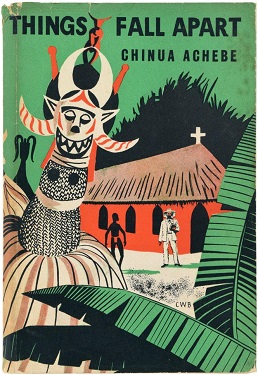
Things Fall Apart is the debut novel of Nigerian author Chinua Achebe first published in 1958. It depicts the events of pre-colonial life in Igboland and the subsequent appearance of European missionaries and colonial forces in the late 19th century. It is seen as an archetypal modern African novel in English, and one of the first novels to receive global critical acclaim. It is a staple book in schools throughout Africa and is widely studied in English-speaking countries around the world. The novel was first published in the United Kingdom in 1958 by William Heinemann Ltd and became the first work published in Heinemann's African Writers Series.

Kwame Kwei-Armah is a British actor, playwright, director and broadcaster. In 2005, Kwei-Armah became the second black Briton to have a play staged in the West End of London when his award-winning piece Elmina's Kitchen transferred to the Garrick Theatre. He was the first black Briton to head a major British national theater, when he took the directorship of the Young Vic in 2018. Kwei-Armah was appointed Officer of the Order of the British Empire (OBE) in the 2012 Birthday Honours for services to drama.
The Ga-Dangbe, Ga-Dangme, Ga-Adangme or Ga-Adangbe are an ethnic group in Ghana, Togo and Benin. The Ga and Dangbe people are grouped respectively as part of the Ga–Dangme ethnolinguistic group. The Ga-Dangmes are one ethnic group that lives primarily in the Greater Accra region of Ghana. Ethnic Ga family names (surnames) include Nikoi, Amon, Kotey, Kotei, Adei, Adjei, Kutorkor, Okantey, Oblitey, Lartey, Nortey, Aryee, Obodai, Oboshi, Torgbor, Torshii and Lante. The following are names derived from the ethnic Dangme and common among the Ningos Nartey, Tetteh, Kwei, Kweinor, Kwetey, Narteh, Narh, Dugbatey, Teye, Martey, Addo, Siaw, Saki, Amanor, Djangba. These are aligned to the ethnic Ga as well: Lomo, Lomotey, Tetteh, Ankrah, Tetteyfio, Laryea, Ayitey, Okai, Bortey, Quaye, Quaynor, Ashong, Kotei, Sowah, Odoi, Ablor, Adjetey, Dodoo, Darku and Quartey.

Ayi Kwei Armah is a Ghanaian writer best known for his novels including The Beautyful Ones Are Not Yet Born (1968), Two Thousand Seasons (1973) and The Healers (1978). He is also an essayist, as well as having written poetry, short stories, and books for children.
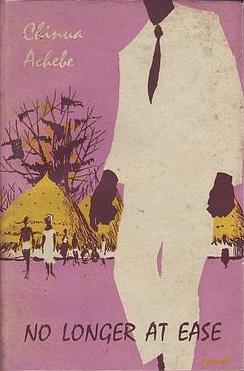
No Longer at Ease is a 1960 novel by a Nigerian author, Chinua Achebe. It is the story of an Igbo man, Obi Okonkwo, who leaves his village for an education in Britain and then a job in the Nigerian colonial civil service, but is conflicted between his African culture and Western lifestyle and ends up taking a bribe. The novel is the second work in what is sometimes referred to as the "African trilogy", following Things Fall Apart and preceding Arrow of God, though Arrow of God chronologically precedes it in the chronology of the trilogy. Things Fall Apart concerns the struggle of Obi Okonkwo's grandfather Okonkwo against the changes brought by the British.
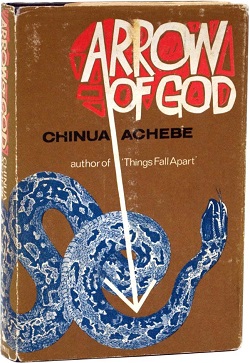
Arrow of God, published in 1964, is the third novel by Chinua Achebe. Along with Things Fall Apart and No Longer at Ease, it is considered part of The African Trilogy, sharing similar settings and themes. The novel centres on Ezeulu, the chief priest of several Igbo villages in colonial Nigeria, who confronts colonial powers and Christian missionaries in the 1920s. The novel was published as part of the influential Heinemann African Writers Series.

A Man of the People is a novel by Nigerian writer Chinua Achebe. Written as a satirical piece, "A Man of the People" follows the story told by Odili, a young and educated narrator, about his conflict with Chief Nanga, his former teacher who enters a career in politics in an unnamed fictional 20th-century African country. Odili represents the changing younger generation, while Nanga represents the traditional West African customs inspired by Achebe's native Nigeria. The book ends with a military coup, similar to the real-life coup organized by Major Chukwuma Kaduna Nzeogwu, Major Adewale Ademoyega, Major Emmanuel Ifeajuna, Captain Chris Anuforo, Major Donatus Okafor, and Major Humphrey Chukwuka.
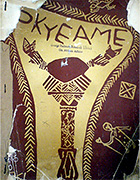
Okyeame was a literary magazine founded by the Ghana Society of Writers in the post-Independence era, which saw the rapid rise of a new generation of thinkers, writers and poets in the country. The first issue of Okyeame appeared in 1960, and issues were published, at irregular intervals, up until 1972. Inspired by Kwame Nkrumah, the first Prime Minister of Ghana, the publication sought to explore the experiences of Africa from a new intellectual framework. Writers published in the magazine include its first editor Kofi Awoonor, Efua Sutherland, Ayi Kwei Armah and Ama Ata Aidoo.

Osiris Rising: A Novel of Africa Past, Present and Future is a novel written by Ayi Kwei Armah and published in 1995. The story revolves around an African-American woman, Ast, who goes to Africa looking for heritage after she gets her PhD. The text addresses a number of contemporary African issues, including the residual colonial institutions that limit African culture, the hypocritical nature of African Americans and expatriates who try to help Africa and the contemplation of "What is African history and culture?" The book is published by Per Ankh, a Senegalese publishing company.
Benjamin Kwakye is a Ghanaian novelist and lawyer. His first novel, The Clothes of Nakedness, won the 1999 Commonwealth Writers' Prize, best first book, Africa, and has been adapted for radio as a BBC Play of the Week. His novel The Sun by Night won the 2006 Commonwealth Writers' Prize, Best Book Africa. His novel The Other Crucifix won the 2011 IPPY award. His is also the winner of the 2021 African Literature Association's Book of the Year Award for Creative Writing.

Kwesi Armah was a Ghanaian politician and diplomat. He was the High Commissioner (Ambassador) to the Court of St. James in London, England, and the Minister of Foreign Trade in the administration of Kwame Nkrumah before the military coup of 1966. He later served in the Council of State in the government of John Kufuor.
Ode Ogede is a Nigerian-born American academic who is professor of African literature and was a lecturer at Ahmadu Bello University.
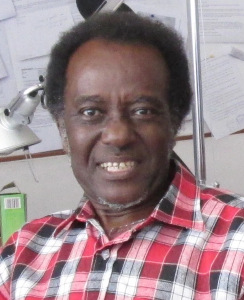
B. Kojo Laing or Bernard Kojo Laing was a Ghanaian novelist and poet, whose writing is characterised by its hybridity, whereby he uses Ghanaian Pidgin English and vernacular languages alongside standard English. His first two novels in particular – Search Sweet Country (1986) and Woman of the Aeroplanes (1988) – were praised for their linguistic originality, both books including glossaries that feature the author's neologisms as well as Ghanaian words.

The Beautyful Ones Are Not Yet Born is a jazz album by Branford Marsalis, leading a trio with Jeff "Tain" Watts and Robert Hurst and with guest appearances from Wynton Marsalis and Courtney Pine. It was recorded May 16–18, 1991, at CTS Studio A, Wembley, England, and June 24, 1991, at RCA Studio B in New York, New York. It peaked at number 3 on the Top Jazz Albums chart.
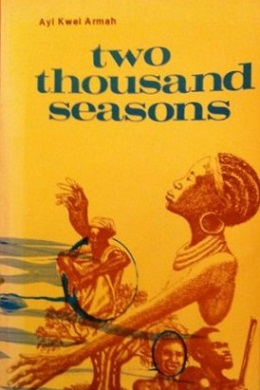
Two Thousand Seasons is a novel by Ghanaian novelist Ayi Kwei Armah. The novel was first published in 1973 and subsequently published a number of times, including in the influential Heinemann African Writers Series. It is an epic historical novel, attempting to depict the last "two thousand seasons" of African history in one narrative arc following a Pan-African approach.
Kwei-Armah is a Ga surname, which means "to find the way". Notable people with the surname include:
This Earth, My Brother is a 1971 novel by Ghanaian novelist Kofi Awoonor published, later republished by Heinemann as part of the influential African Writers Series.
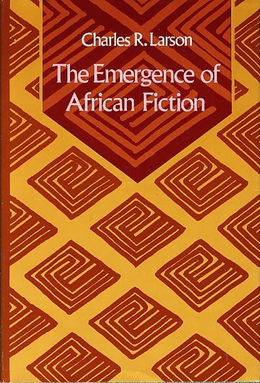
The Emergence of African Fiction is a 1972 academic monograph by American scholar Charles R. Larson. It was published initially by Indiana University Press, and again, in a slightly revised edition, in 1978 by Macmillan. Larson's study has elicited very different responses: it was praised as an early and important book in the study and appreciation of African literature in the West, but for others it remained stuck in a Eurocentric, even colonizing mode in which Western aesthetics were still the unspoken standard for artistic assessment.
Ghanaian literature is literature produced by authors from Ghana or in the Ghanaian diaspora. The tradition of literature starts with a long oral tradition, was influence heavily by western literature during colonial rule, and became prominent with a post-colonial nationalist tradition in the mid 20th century. The current literary community continues with a diverse network of voices both within and outside the country today, including film, theatre, and modern digital formats such as blogging.













